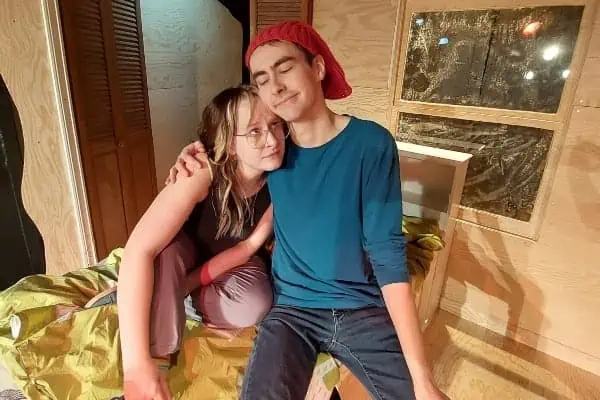I was lucky enough to be able to see The Soul Menders twice. Because of travel plans, I had to miss opening night and reviewed a dress rehearsal, instead, with all the rules about certain things I couldn’t talk about.
One of those taboos was talking, really, about performance. Actors still had at least three rehearsal nights, which might include two run-throughs, to get everything down. It would be unfair to talk about them as if they were performing on opening night.
I was OK with these rules. And I gave my review.
But I wanted to go back and see the play as a play — with an audience, a program, all the “polishments” in place. And I wanted to answer this question: What happens to a play from its first public performance (and I was the public, and so were the three photographers with me) to its final week?
How does a play change through performance?
Normally, a director doesn’t have much influence after the play is performed. He or she may tweak a scene here or there after opening night, but often the cast is on their own now. Like some post-graduation, they now run the show. So, he’s out.
I didn’t think the play could change that much from when I saw it. Honestly, I thought the actors did a fine job in that dress rehearsal. None of them believe me. “It was a dress rehearsal. Come see it on a real night,” said one of them when I met them in town.
I saw it Wednesday night, Dec. 2.
It makes a big difference to have an audience, yes. You get to hear where people are laughing and it makes the actors compensate for laughs … even to build off of those laughs. Which they did. Laughter makes you laugh.
Mostly, though, I got to see a cast that had become comfortable in their roles, and their performance was nuanced in a way I hadn’t seen during dress rehearsal. (I can hear Lizzie tell me, “Duh.”)
Well, Lizzie, what I mean is that it was cool to watch you guys know your parts so well to play with those parts – trying out new ways of delivering them, new subtle eye movements, expressions, silences.
The comic timing was crisp. The crazy moments crazier, feeding off the laughter of the audience. I could see more reasons why Eric (Doug Mayr) was ultimately rejected by Bea. His delivery in this show demonstrated his inability to really connect with Bea. But I got that scene more.
I also “got” why Gordon (Roy Ness) left his daughter on the anniversary of her mother’s death to go spend the day with Bea. A second watching showed me that Lizzie (Krystal Dawn) made arrangements to spend Christmas afternoon with her Dad on the train … besides, she wouldn’t be up for Christmas morning.
Actually, I’m not sure what time of the day the last scene takes place —Christmas morning, Christmas Eve – because Christmas Eve included the Dominatrix scene …
Anyway, I didn’t feel bad for Lizzie because I knew she had time planned with her Dad later.
I could also see a different angle on Neda (Sophia Marnik). She played Neda more prickly in this version, cutting off help from Bea, twice, and acting like she could do it on her own. I saw this less as her strength and more as her coping with a difficult situation.
Gordon helped me understand and like Bea a bit more this time around. In explaining her to Lizzie, I remember him saying that Bea was annoying and rude (my words) because she was hurting. I could buy that.
I wish, though, that there would have been a 41st scene, a scene tucked in between all the frantic, where Bea sits alone in her kitchen just looking away. No music. Just those quiet private moments of the disheartened. I’ve had them. Everyone who has had loss has them. One minute would have been great.
Bea really opened up at the park with Gordon, which helped balance out her character.
In fact, all the characters played with silence much better this time around. They were comfortable with a look, with a wait, with knowing what was going to happen next but playing like they didn’t.
Stephen (Ben Barrett-Forrest) found the transition between surly teen, with some killer scowls, to Christmas Elf. Eric found the absurdity in talking about kitchen gnomes. Neda’s voice broke on the phone with her mother. Lizzie lifted her face at key moments and still found real panic, when Gordon collapses, to bring a tear to my eye.
I loved the way Bea said “pretty little cups” when begging for tea from Neda. Even the singing didn’t seem as out of place this time around and the actors were actually, at times, making fun of it themselves.
The rough edges of the play, even some I had not really noticed before, became smooth. The actors provided the transitions between 40 scenes, with help from the smoothest lighting and sound transitions, and pulled together a play till it seemed more like one play than a group of scenes.
This is what happens after multiple performances: actors find their groove. They colour in the spaces between the lines with honest reactions. They cover for each other. They live inside the reality of the play as if they belonged there.
Jerome Stueart has a BA in Theatre, writes fiction and enjoys seeing a good play.




